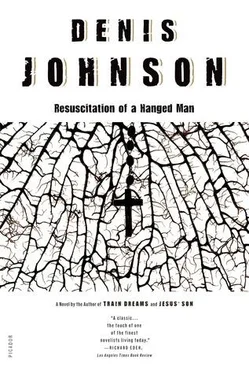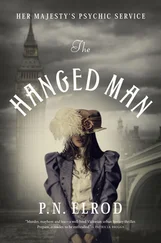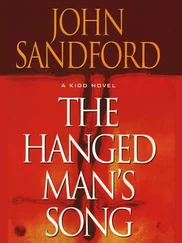Denis Johnson
The Resuscitation of a Hanged Man
Life goes into new forms.
— NEAL CASSADY
He came there in the off-season. So much was off. All bets were off. The last deal was off. His timing was off, or he wouldn’t have come here at this moment, and also every second arc lamp along the peninsular highway was switched off. He’d been through several states along the turnpikes, through weary tollgates and stained mechanical restaurants, and by now he felt as if he’d crossed a hostile foreign land to reach this fog with nobody in it, only yellow lights blinking and yellow signs wandering past the car’s windows silently. There was a single fair-sized town on the peninsula, a place with more than one shopping center in it and boarded-up seafood stands strung along the roadside, and the traveller, whose name was Leonard English, thought he’d stop there for a drink, just one drink, before going on. But he was drawn into a very interesting conversation with a man whose face got to look more and more like a dead pig’s face in the dim red light. What they were talking about really wasn’t all that memorable — it was more the man’s face — but the drinks got slippery and English’s money was all wet by the time he got out of there, and as he made a U-turn through an intersection the world seemed to buckle beneath him and the car’s hood flew up before the window. English held the wheel and jammed the brake, waiting for the rest of this earthquake, or this bombing or God’s wrath, to destroy the town. A shriek, like the tearing of metal train wheels along metal rails, died away. Somebody was opening the door for him … but he was opening the door for himself, and now he was getting out of the car. There wasn’t any cataclysm. It was just a town at night, quiet and useless, with buildings that looked like big toys or false fronts lit by arc lamps and backed by a tremendous bleakness. Somehow his Volkswagen had climbed up onto a traffic island. The whole thing would have been embarrassing, but he couldn’t seem to form any clear picture of what had happened. Blood ran down his forehead and blinded half his sight. The air reeked: the tank was ripped and twenty dollars’ worth of gasoline covered the asphalt. In his imagination it burst into flames. A cabdriver stopped and came to stand beside him and said, “You made a wrong turn.” English did not dispute this.
To reach his destination at the end of the Cape, English engaged the cabdriver’s services, services he couldn’t afford any more than he was going to be able to afford this accident.
“He gonna chadge you exry,” the cabdriver said.
Chadge? English guessed the driver was talking about the old man who’d towed his car away, but what was he trying to say? “Right,” English said.
“You from Bwostin?” the cabbie asked him.
This was just what the policeman had asked him amid the wreckage, saying Boston like Bwostin. “Mr. Leonard English,” the officer had said. Looking right at English’s Midwestern driver’s license, he had inquired after his origins: “You from Bwostin?” “I just got here from Lawrence, Kansas,” English told the officer. “Kansas?” the officer said. “Lawrence, Kansas?”—and English said yes. A little later the officer said, “You’re drunk. But I’m gonna let you off.”
“Drunk? I’m not drunk,” English said.
“Yes you are, you most definitely are,” the officer said, “or you wou’nt be arguing with me.” With a certain vague tenderness, he was applying a Band-Aid to English’s forehead.
English said, “I’m a little tipsy. I don’t understand what you’re saying.”
“That’s better,” the officer said.
English was glad when the policeman left him in the cabdriver’s custody, because he felt cut off from the world here, and to be scrutinized by a powerful figure in a place he hadn’t even seen in the daylight yet left him shaken. Properly speaking, this wasn’t even a peninsula. He’d had to cross a large bridge to get here. It was an island. A place apart.
And now, as they rattled toward this phony peninsula’s other end, English was sitting up front with the cabdriver. English was dizzy, and on top of that there seemed to be an exhaust leak, but the driver kept saying, “You’re A-OK now, brother.” “No, I’m not,” English said. They weren’t in a taxicab. It was almost six in the morning and the driver was going in his station wagon to his home a couple of towns down the road, taking English dozens of miles out of his way for twenty dollars. “I like to drive,” the cabbie said. He puffed on a joint wrapped in yellow paper.
English turned it down. “Grass makes me feel kind of paranoid.”
“I don’t get paranoid,” the driver said. But he was a paranoid personality if English had ever seen one. “This beyond here, this is absolutely black,” the driver said, pointing with the glowing end of his reefer ahead, to where the four-lane highway turned two-way. “No more lights, no more houses”—he drew a chestful of smoke—“nuthin, nuthin, nuthin. We won’t see no traffic. Not car one.” Immediately the red taillights of another car shone ahead. “I think I know this guy.” He stomped the gas. “I think this is Danny Moss”—pronounced Dyany Mwas—“is that a Toyota? Cheez, looka how fast this guy’s running.” They were doing eighty. “ We’re gonna catch you, Danny. We’re gaining on this sucker.” But they were falling behind. “Ain’t that a Toyota?” he said. The red taillights ahead went right, and the cabdriver’s gaze followed their course as he and his passenger sailed past the turn they’d taken. “Yeah, that’s a Toyota! Yeah, that’s him! Yeah, that’s Danny Moss!”
Actually, they hadn’t come to any place of absolute blackness. In a little while the sun was up, burning without heat above the road, and before they reached Provincetown they sped through three or four more little villages, in one of which they stopped and had breakfast. It turned out that Phil, the driver, subscribed to the branch of historical thought characterized by a belief in extraterrestrial interference, previous highly advanced civilizations, and future global cataclysms, both human-made and geological. English now learned something about these things. “All the elemental phosphorus is gonna be like zero, completely gone. We’ll be strangling each other in the streets for a little phosphorus,” Phil said, “elemental phosphorus. The roads are gonna run with blood. Nobody even knows about it. Nobody’s even surprised. Five thousand years ago on the earth they had a big cataclysm and a huge, what is it, whatyoucallit, megadeath. Partly because of running out of some of these elements you need in your body, like phosphorus.” He got into a philosophical talk with their waitress and told her, “I think our world could really be some form of Hell, you know what I’m saying?” The waitress saw his point. “There’s so much suffering here on earth,” she said. Phil knew all the waitresses, and it was after nine when they got back on the road.
English fell asleep. When he woke up, the route had gone strange. White dunes made walls on either side of them. European music came out of the radio. They drove through a drift of sand.
In a few minutes his head was clear again, and he was looking at the sandy outskirts of the last town in America. The sun was shining above it now. A tower made of stone rose up in the distance. The seaside curved north, to their left, and the wooden buildings were laid out solid, bright and still as a painting, against the beach.
Читать дальше












